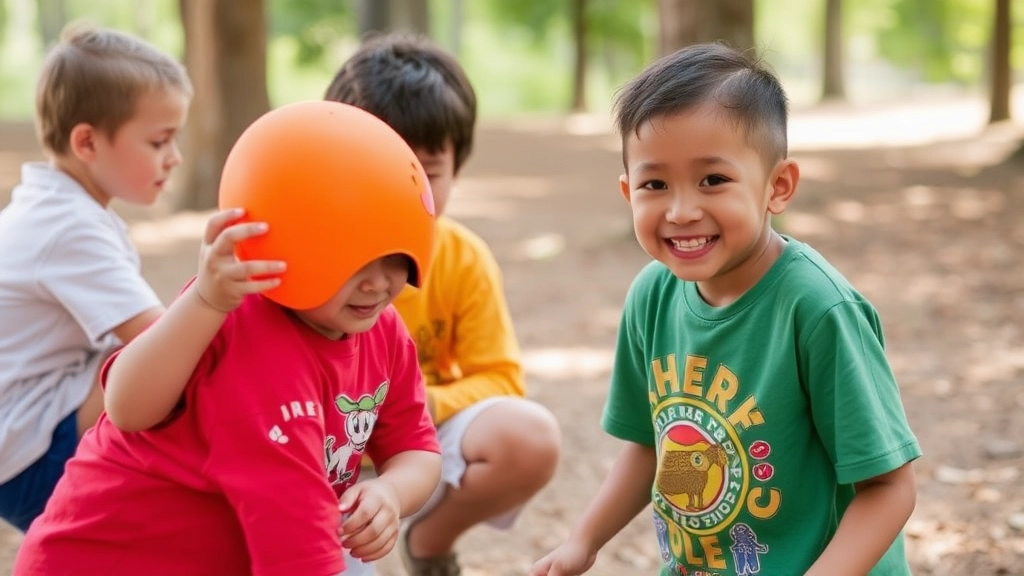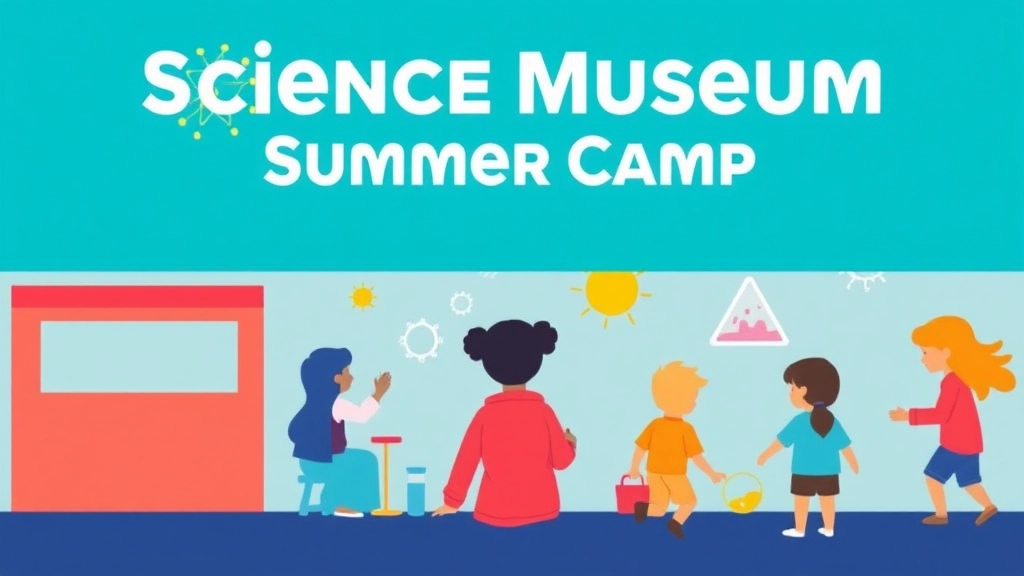Science Museum Summer Camps
Are you looking for a way to keep your kids engaged, learning, and having fun this summer? Look no further than Science Museum Summer Camps! With a variety of exciting themes, these camps offer hands-on STEM learning opportunities that foster creativity and critical thinking. From robotics to space exploration, there’s something for every budding scientist. Trust me, these camps are designed to make learning an adventure, not a chore.
What to Expect
In this article, we’ll explore everything you need to know about Science Museum Summer Camps. We’ll cover:
- Age groups and eligibility
- Notable activities
- Importance of early registration
- Costs and scholarship options
- Long-term benefits for future STEM careers
- Tips on daily expectations
- How to choose the right camp for your child
So, buckle up and get ready to discover how these camps can turn your child’s summer into an unforgettable learning experience!
Exciting Summer Camp Themes at Science Museums
Are you wondering how to keep your kids engaged and learning during the summer break? Science museum summer camps might just be the answer. With exciting summer camp themes at science museums, your child can dive into a world of discovery and fun. Trust me, these camps are designed to make learning an adventure, not a chore.
Why Summer Camp Themes Matter
You might be thinking, “Why should I care about the theme of a summer camp?” Well, let me break it down for you:
- Themes keep kids engaged: A well-thought-out theme can make learning more exciting.
- Variety: Different themes cater to different interests, ensuring there’s something for everyone.
- Focused learning: Themes help in diving deeper into specific subjects, be it robotics, space exploration, or marine biology.
Popular Themes You Can Expect
Robotics and Engineering
Imagine your child building a robot from scratch. Sounds cool, right? Robotics camps teach kids the basics of engineering and programming, all while having a blast.
Space Exploration
Got a future astronaut at home? Space-themed camps cover everything from the solar system to black holes. Kids even get to create their own rockets and simulate space missions.
Environmental Science
For the budding environmentalists, these camps focus on topics like conservation, climate change, and sustainable living. Kids get hands-on experience with eco-friendly projects.
Chemistry and Physics
Remember those cool experiments you saw in school but never got to try? These camps let kids conduct real experiments, making learning tangible and exciting.
Marine Biology
If your child loves the ocean, a marine biology camp is perfect. They’ll learn about marine life, ecosystems, and even get to interact with some sea creatures.
Real Stories from Real Parents
Let me share a quick story. Jane, a mom of two, was worried her kids would spend their summer glued to screens. She enrolled them in a science museum camp with a space exploration theme. Not only did her kids learn a ton, but they also made new friends and developed a genuine interest in science. Jane says it was the best decision she made that summer.
Internal Links to Check Out
Age Groups and Eligibility for Science Museum Summer Camps

Ever wondered if your kiddo is the right age for a science camp?
Let’s break it down.
Who Can Join?
Science museum summer camps usually cater to a wide range of age groups.
Think anywhere from 5 to 17 years old.
But it’s not a one-size-fits-all.
Each camp might have its own specific age brackets.
Why the Age Split?
Simple.
Younger kids need more basic, hands-on activities.
Older ones? They’re ready for more complex stuff.
Like robotics or space exploration.
Checking Eligibility
Here’s what you need to know:
- Age Groups: Typically, camps are divided into categories like 5-7, 8-10, 11-13, and 14-17.
- Skill Levels: Some camps might ask for a bit of background knowledge.
- Special Needs: Many camps are inclusive. Just check the details.
Real Talk:
You might be thinking, “Will my child fit in?”
Absolutely.
These camps are designed to be inclusive and engaging for all age groups.
Pro Tips:
- Read the Camp Description: Always check the specific age range for each camp.
- Ask Questions: Don’t hesitate to call the museum and ask about eligibility.
- Visit the Museum: If possible, take a tour. It’ll give you a feel for the environment.
Hands-On STEM Learning Opportunities at Camp
Are you worried your child might spend the summer glued to screens? Wondering how to keep them engaged and learning while having fun? Let me tell you, Science Museum Summer Camps are where it’s at! These camps offer incredible hands-on STEM (Science, Technology, Engineering, Mathematics) learning opportunities that can ignite a lifelong passion for discovery and innovation.
Why Hands-On Learning Rocks
First off, let’s talk about why hands-on learning is so effective. Kids don’t just sit and listenâthey get to build, experiment, and create. This kind of active participation helps them grasp complex concepts more easily. Plus, it’s way more fun than just reading a textbook.
What Exactly Will They Do?
So, what can your child expect to do at a Science Museum Camp? Here’s a sneak peek:
- Building Robots: Kids can dive into the world of robotics. They’ll learn how to design, build, and program their own robots. Imagine the thrill of seeing your creation come to life!
- Conducting Experiments: From chemical reactions to physics projects, there’s no shortage of experiments. Your child will get to be a real scientist, making hypotheses and testing them out.
- Exploring Space: Camps often include activities focused on space exploration. Think rocket building, star-gazing, and even virtual reality trips to Mars.
- Coding and Programming: In today’s tech-driven world, coding is a must-have skill. Camps offer beginner to advanced coding classes where kids can create their own games or apps.
Real Stories, Real Impact
Let me share a story. Last summer, my niece attended a Science Museum Camp. She was always curious but never really into science. After a week of hands-on activities, she came home talking non-stop about her robot project and how she wants to be an engineer. She even started a science club at her school! This is the kind of transformation these camps can inspire.
Benefits Beyond the Classroom
Hands-on STEM learning at camp does more than just teach science. It fosters critical thinking and problem-solving skills. Kids learn to ask questions, think creatively, and work through challenges. These are skills that will benefit them in any career they choose.
Key Takeaways
- Interactive Learning: Kids actively participate in building, experimenting, and creating.
- Diverse Activities: From robotics to space exploration, there’s something for every interest.
- Skill Development: Beyond STEM, kids develop critical thinking, creativity, and problem-solving skills.
- Real-World Impact: These experiences can ignite a passion for STEM and influence future career choices.
So, what are you waiting for? Early registration is key to securing a spot in these popular camps. Don’t miss out on this incredible opportunity for your child to learn, grow, and have a blast! For more tips on preparing for camp, check out our Summer Camping Top Tips and Gear Essentials. Also, explore our Ultimate Summer Camp Calendar Guide to plan your summer effectively.
How Science Museum Camps Foster Creativity and Critical Thinking

Ever wondered how to keep your kids engaged and learning during the summer?
You’re not alone.
Many parents worry about how to balance fun and education when school’s out.
That’s where science museum camps come in.
Why Science Museum Camps?
First off, these camps are a goldmine for fostering creativity and critical thinking.
The Magic Ingredients:
- Hands-On Activities:
- Kids don’t just watch; they do.
- Building robots, experimenting with chemicals, or creating digital art.
- These activities make learning tangible.
- Problem-Solving Challenges:
- Real-world problems to solve.
- Think: “How can we clean up an oil spill?” or “What makes a rocket fly?”
- Kids get to think critically and brainstorm solutions.
- Collaborative Projects:
- Teamwork is key.
- They learn to communicate ideas and listen to others.
- This builds not just creativity but also interpersonal skills.
Stories from the Field:
I remember a parent telling me how their child came home from a camp and couldn’t stop talking about the “Mars Rover” they built.
They were so pumped up, they even started a science club at school.
That’s the kind of impact we’re talking about.
Why It Works:
- Engagement: Kids are more engaged because they’re having fun.
- Retention: They remember what they learn because they’re actively involved.
- Application: They can apply these skills in real-world scenarios.
Bullet Points to Remember:
- Hands-on activities = Active Learning
- Real-world problems = Critical Thinking
- Team projects = Collaboration
Ready to Foster Your Child’s Creativity?
Don’t wait.
Sign up for a science museum camp and watch your child’s imagination and problem-solving skills soar.
Notable Science Museum Camp Activities: Robotics, Space Exploration, and More
Are you wondering what kind of activities your child will dive into at a science museum summer camp? Let me break it down for you. These camps are packed with hands-on, mind-blowing activities that keep kids engaged and learning. From robotics to space exploration, there’s something for every budding scientist.
Robotics: Building the Future
Robotics is a big hit at these camps. Kids get to build and program their own robots, which isn’t just cool but also teaches them about engineering and coding. Imagine the thrill on their faces when their robot finally moves or completes a task! Here’s what they usually get to do:
- Construct robots from scratch using kits and materials provided by the camp.
- Learn basic coding to program their robots to perform specific tasks.
- Participate in robot challenges where they compete or collaborate to solve problems.
Space Exploration: Reach for the Stars
Space exploration activities are another highlight. Who doesn’t dream of being an astronaut? These camps make that dream a bit more tangible. Kids can:
- Build and launch model rockets, understanding the physics behind propulsion.
- Explore the solar system through interactive planetarium shows and simulations.
- Engage in astronaut training exercises that mimic real-life space missions.
Chemistry and Biology: Hands-On Experiments
Chemistry and biology activities are designed to make science feel like magic. These aren’t your run-of-the-mill classroom experiments. Kids can:
- Create chemical reactions that result in colourful explosions or gooey slime.
- Dissect plants and animals (ethically sourced) to understand anatomy and physiology.
- Grow their own crystals and learn about molecular structures.
Environmental Science: Connecting with Nature
Environmental science activities get kids thinking about the planet. These camps often include:
- Field trips to local ecosystems where kids can collect samples and data.
- Hands-on recycling projects that teach the importance of sustainability.
- Gardening and composting activities to learn about plant biology and soil health.
Engineering Challenges: Problem-Solving Fun
Engineering challenges are all about creativity and critical thinking. Kids might:
- Design and build bridges, towers, or other structures using everyday materials.
- Solve real-world problems through guided projects that require innovative solutions.
- Compete in engineering challenges that test their designs under various conditions.
Why These Activities Matter
All these activities aren’t just funâthey’re educational powerhouses. They nurture creativity, boost problem-solving skills, and ignite a passion for STEM. By exposing kids to a variety of scientific fields, these camps help them discover what they’re truly passionate about.
Early Registration is Key
Now, here’s a pro tip: these camps are super popular, and spots fill up fast. If you want your child to experience these incredible activities, early registration is a must. Trust me, you don’t want to miss out. For more tips on choosing the right camp, check out our Ultimate Guide to Choosing a Cheer Summer Camp. And if your child is interested in coding and robotics, explore our Top STEM Summer Camps for 2024.
Importance of Early Registration for Popular Camps

Ever tried signing up for a summer camp last minute, only to find it’s fully booked? Frustrating, right?
Well, when it comes to science museum summer camps, early registration is key.
These camps are popular for a reason. They’re packed with exciting activities, hands-on STEM learning, and a chance for your kid to explore their creativity and critical thinking.
And guess what? Spots fill up fast.
Why Early Registration Matters
- Guarantee a Spot: You don’t want your child to miss out on an incredible experience, do you? By registering early, you ensure they get a spot in their preferred camp.
- Better Planning: Early registration gives you time to plan your summer schedule. No last-minute scrambles.
- Access to Discounts: Many camps offer early bird discounts. Save money while securing a spot. Win-win!
- Peace of Mind: Knowing your child’s summer plans are sorted brings peace of mind. No stress, just excitement.
How to Stay Ahead
- Set Reminders: Mark your calendar with registration dates. Set reminders on your phone. Don’t miss out.
- Join Mailing Lists: Sign up for newsletters from your local science museums. They’ll alert you when registration opens.
- Research Early: Look into different camps ahead of time. Know what’s available and what interests your child.
- Talk to Other Parents: Chat with other parents about their plans. They might have tips on the best camps and when to register.
Real-Life Example
Last summer, my friend Sarah missed out on a robotics camp for her son. She waited too long to register. This year, she marked her calendar and signed up the first day registration opened. Her son had a blast, and Sarah avoided the stress.
Cost and Scholarship Options for Science Museum Camps
Worried about the Cost of Science Museum Camps? You’re Not Alone.
Let’s be real. The idea of sending your kid to a science museum camp sounds fantastic, right? But then you see the price tag, and suddenly, you’re second-guessing if it’s worth it. Trust me, I get it. The cost of these camps can make you break into a sweat. But here’s the good news: there are ways to make it more affordable.
Breaking Down the Costs
First things first, let’s break down what you’re actually paying for:
- Tuition Fees: This covers the basics – the actual cost of the camp, including materials, access to museum exhibits, and specialised instruction.
- Additional Costs: Sometimes, there are extra fees for things like meals, field trips, or special activities.
Scholarship Options: Making It Affordable
Now, let’s talk about scholarships. Many science museums understand that not everyone can afford the full cost of camp, and they offer scholarships to help out. Here’s how you can tap into those resources:
- Early Bird Discounts: Registering early can save you a chunk of change. Many camps offer significant discounts if you sign up months in advance.
- Need-Based Scholarships: These are typically based on your family’s income. You’ll need to provide some financial information, but it’s worth it if it means your child gets to go to camp.
- Merit-Based Scholarships: If your kid has a knack for science or has done something impressive in the STEM field, they might qualify for a merit-based scholarship.
- Community Grants: Some local organisations and businesses offer grants to help families afford educational programs like these camps.
How to Apply for Scholarships
Applying for scholarships might seem daunting, but it’s pretty straightforward:
- Check the Museum’s Website: Most museums list their scholarship options online. Look for a section dedicated to financial aid or scholarships.
- Prepare Your Documents: Gather any required documents, like tax returns or letters of recommendation.
- Submit Your Application: Follow the instructions carefully. Deadlines are crucial, so don’t miss them.
- Follow Up: If you don’t hear back, don’t be shy. Give them a call or send an email to check the status of your application.
Real Stories from Real Parents
Let’s sprinkle in some real-life examples. Sarah, a single mum from Manchester, was stressed about the cost but found a need-based scholarship that covered 75% of the fees. âIt was a lifesaver,â she told me. âMy son had the best summer ever, and I didn’t have to break the bank.â
Why It’s Worth It
At the end of the day, investing in a science museum camp can pay off in spades. These camps offer hands-on STEM learning opportunities that can spark a lifelong passion for science and technology. Plus, they foster creativity and critical thinkingâskills that are invaluable for future STEM careers.
So, don’t let the cost scare you off. With a little research and some early planning, you can find ways to make these incredible experiences accessible for your child. And trust me, it’s worth every penny.
If you’re looking for more affordable options, consider checking out free summer camps for autistic children. Additionally, for those in the area, City of Rochester summer camps offer great programs that won’t break the bank.
Benefits of Science Museum Camps for Future STEM Careers

Ever worry about your child’s future in STEM?
Wonder if they’re getting the right exposure early on?
Science Museum Camps could be the game-changer you’re looking for.
These camps aren’t just about fun; they’re a springboard for future STEM careers.
Here’s how:
Real-World Skills
Kids get hands-on experience with real-world tech.
Think robotics, coding, and even space exploration.
These aren’t just buzzwords—they’re the future.
And your child gets to dive in headfirst.
Boosting Creativity and Critical Thinking
STEM isn’t just about numbers and formulas.
It’s about solving problems creatively.
Science Museum Camps foster this by encouraging kids to think outside the box.
They’ll tackle challenges that require innovative solutions.
Networking Opportunities
Yes, even kids can network.
They’ll meet peers with similar interests and passions.
Who knows? They might meet their future business partner or collaborator.
Confidence Building
Ever seen a child light up after solving a tough problem?
It’s pure magic.
These camps build confidence by showing kids they can tackle big challenges.
Exposure to Cutting-Edge Tech
Kids get to play with the latest gadgets and gizmos.
This isn’t just cool—it’s crucial.
Early exposure means they’re not intimidated by new tech later on.
Inspiration from Role Models
Many camps bring in guest speakers from the STEM world.
Hearing stories from real scientists and engineers can be incredibly inspiring.
It makes STEM careers feel tangible and achievable.
Scholarships and Competitions
Some camps offer scholarships or prep kids for STEM competitions.
These accolades can be a big plus on future college applications.
Parental Peace of Mind
Knowing your child is engaged in something educational and fun is a huge relief.
Plus, you’re investing in their future.
What to Expect
Daily schedules are packed, but manageable.
Kids get a mix of structured learning and free exploration.
Parental involvement is often encouraged, so you can stay in the loop.
Choosing the Right Camp
Not all camps are created equal.
Look for ones that align with your child’s interests and age group.
Early registration is key—these camps fill up fast.
What to Expect: Daily Schedules and Parental Involvement
Alright, so you’re thinking about enrolling your kid in a science museum summer camp. You’re probably wondering what their daily routine will look like and how much you’ll need to be involved. Let’s break it down.
Daily Schedules: A Peek into Your Kid’s Day
Morning Kickoff
- 8:00 AM â 9:00 AM: Drop-off and registration. This is when kids start trickling in, getting their name tags, and meeting their camp buddies. Think of it as the warm-up lap before the main event.
- 9:00 AM â 10:30 AM: The first session kicks off. This could be anything from an interactive science show to a hands-on experiment. It’s designed to grab their attention and get those brain cells firing.
Mid-Morning Break
- 10:30 AM â 10:45 AM: Snack time. Kids get a quick break to refuel. You’ll want to pack something easy but nutritious.
Second Session
- 10:45 AM â 12:00 PM: More hands-on activities. This is where they might dive into robotics, build a model rocket, or explore the wonders of the human body. The goal is to keep it engaging and educational.
Lunch Break
- 12:00 PM â 1:00 PM: Lunch hour. Some camps provide lunch, but often it’s a BYOL (Bring Your Own Lunch) situation. Either way, it’s a good time for kids to socialise and make new friends.
Afternoon Activities
- 1:00 PM â 3:00 PM: This could be a mix of guided activities and free exploration time. Maybe they’ll get to roam around the museum exhibits or participate in a group project. It’s structured but flexible enough to keep them interested.
Closing Session
- 3:00 PM â 4:00 PM: Wrap-up and review. This is when they go over what they learned, maybe share their projects, and get excited about the next day.
Pick-Up Time
- 4:00 PM â 5:00 PM: Pick-up window. You’ll collect your little scientist, hear all about their day, and probably get bombarded with a million questions they now have about the universe.
Parental Involvement: How Much is Too Much?
Now, let’s talk about your role. How much do you need to be involved? Here’s the scoop:
- Drop-Off and Pick-Up: Obviously, you’ll need to handle the logistics of getting them to and from camp. But that’s not all.
- Stay Informed: A lot of camps send daily or weekly newsletters to keep you in the loop. Make sure you read these. They’ll often include what your child is learning, upcoming events, and any special requirements.
- Be Supportive: Engage with your child about what they’re learning. Ask questions and show interest. It reinforces their excitement and makes them feel like their new knowledge is valuable.
- Special Events: Some camps have parent days or end-of-camp showcases. These are great opportunities to see what your child has been up to and to celebrate their achievements.
Real Concerns, Real Answers
âWhat if my kid doesn’t like it?â
- Most camps offer a trial day or a flexible refund policy. It’s worth checking out before you commit.
âWill my child get enough attention?â
- Camps usually maintain a low student-to-instructor ratio to ensure each child gets plenty of guidance and support.
âIs it safe?â
- Absolutely. Science museums follow strict safety protocols, especially when it comes to hands-on experiments. They’ve got your back.
So, there you have it. A day at a science museum camp is jam-packed with learning, fun, and new experiences. And as a parent, your involvement is crucial but manageable. It’s all about striking that perfect balance to make the most of this incredible opportunity. For more insights, check out our Ultimate Guide to Kids Summer Camps and explore STEM Summer Camps: Benefits and How to Choose for additional tips.
How to Choose the Right Science Museum Camp for Your Child
Ever been stumped on picking the perfect summer camp for your kid?
I get it.
There are so many options, and you want to make sure it’s worth every penny and minute.
Let’s break it down.
What’s Your Child Into?
First things first, figure out what your kid loves.
Are they into robots, space, or maybe they’re all about dinosaurs?
Knowing their interests helps narrow down the options.
Age Matters
Not all camps are created equal.
Some are tailored for younger kids, while others are better for teens.
Check the age groups and eligibility before you get too excited.
Hands-On Learning
Look for camps that offer hands-on STEM activities.
Kids learn best when they can touch, build, and experiment.
Ask if they’ll be doing real science projects, not just watching demos.
Check the Schedule
Daily schedules can vary a lot.
Some camps are full-day, others just a few hours.
Make sure it fits your family’s routine.
Read Reviews
Parents love to share their experiences.
Look for reviews and testimonials.
Did other kids have fun?
Did they actually learn something?
Visit the Museum
If you can, visit the science museum hosting the camp.
Get a feel for the environment.
Is it safe, clean, and engaging?
Cost and Scholarships
Let’s talk money.
Science museum camps can be pricey.
Check if they offer scholarships or discounts.
For more information on camp costs, check out our detailed guide on summer camp costs.
Early Bird Gets the Worm
Popular camps fill up fast.
Register early to snag a spot.
Ask About Parental Involvement
Some camps encourage parents to join in on certain days.
Find out if you’ll be needed or if it’s a drop-and-go situation.
Future Benefits
Think long-term.
How will this camp benefit your child’s future STEM career?
If you’re looking for camps that offer both fun and educational benefits, consider checking out the Ivy League summer camps.
Trust Your Gut
At the end of the day, trust your instincts.
You know your child best.
Choosing the right science museum camp can feel overwhelming.
But with these tips, you’ll find the perfect fit.
And your kid will have a blast while learning.
That’s a win-win.
So, what are you waiting for?
Get out there and find the best science museum camp for your child.
Happy hunting!
FAQs about Science Museum Summer Camps
What age groups are eligible for Science Museum Summer Camps?
Science museum summer camps typically cater to children aged 5 to 17. However, each camp may have specific age brackets, so it’s important to check the camp description for precise age ranges.
Why are camps divided into different age groups?
Younger children require more basic, hands-on activities, while older kids are ready for more complex subjects like robotics or space exploration. This ensures that activities are age-appropriate and engaging for all participants.
How can I check if my child is eligible for a specific camp?
Check the camp’s age groups, skill level requirements, and inclusivity for special needs. It’s always a good idea to read the camp description thoroughly and contact the museum if you have any questions.
How do Science Museum Camps foster creativity and critical thinking?
These camps use hands-on activities, problem-solving challenges, and collaborative projects to engage children. Activities like building robots, experimenting with chemicals, and solving real-world problems help kids think critically and creatively.
Why is early registration important?
Early registration guarantees your child a spot in their preferred camp, allows for better planning, may provide access to early bird discounts, and offers peace of mind knowing your summer plans are set.
What are the benefits of Science Museum Camps for future STEM careers?
These camps provide hands-on experience with real-world technology, boost creativity and critical thinking, offer networking opportunities, build confidence, and expose kids to cutting-edge tech. They also provide inspiration from role models and may offer scholarships or prep for STEM competitions.
How can I stay ahead with camp registration?
Set reminders for registration dates, join mailing lists from local science museums, research camps early, and talk to other parents for tips on the best camps and registration timelines.
What should I expect from a Science Museum Camp?
Camps usually have a mix of structured learning and free exploration. Daily schedules are packed but manageable, and parental involvement is often encouraged to keep you in the loop.
How do I choose the right camp for my child?
Look for camps that align with your child’s interests and age group. Early registration is crucial as these camps fill up quickly.
References
-
Science Museum Summer Camps – Learn and Discover
-
Summer Camps That Teach Kids to Love Science – Smithsonian Magazine
-
STEM Summer Camps Boost Creativity and Critical Thinking – Edutopia

